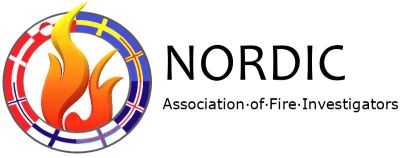Code of Ethics
We will:
- as fire and arson investigators, regard ourselves as members of a vital and ethical profession;
- conduct both our personal and official lives so as to inspire the confidence of the public;
- regard it our duty to avail ourselves of every opportunity to learn more about our profession;
- encourage and support professional standards for fire and arson investigators;
- assist our members in obtaining world class training and professional qualifications;avoid alliances with those whose goals are inconsistent with an honest and unbiased investigation;
- bear in mind always that we are truth-seekers; that it is important to protect the innocent, hold accountable those responsible, and convict the guilty.
Code of Conduct
When there has been a fire, different authorities or other interested partiers want to investigate the events that allowed the fire to occur. The reason for this may be more, but the main reason, regardless of which organization one belongs to, is to clarify the cause of the fire, as it should be used as a basis for preventive actions and, if necessary, placing a responsibility for the fire to occur.
With the term cause of the fire it means the conditions that allowed the fire to occur.
This means that more things must be identified and described, for example:
- The ignition source.
- The first ignited material.
- What conditions caused the heat source and the first ignited material to come into contact with each other.
- What caused the fire to spread the way it did.
This can be a difficult task for the fire investigator and it requires good competences. It requires knowledge of the physical laws of fire dynamics, fire physics, and knowledge of how materials behave under a fire. It also requires knowledge of how different fire fighting techniques and tactics affects the fire, as well as knowledge about the construction of the building, interior design, etc and various active and passive fire protection systems are crucial.
Of course this makes great challenges for the fire investigators.
NAFI is an organization whose purpose is to help developing knowledge, methods and tools for fire investigation. We want the greatest possible legal certainty for all those affected by a fire.
Because of that we expect the people who conduct fire investigations to have competencies that meet the difficult challenges of investigating the cause of a fire.
NAFI has the expectation that the persons carrying out fire investigations:
- are able to verify that they have the competencies relevant to the task and that the competencies have been acquired through relevant[1]
- uses a scientific method in which the process is to formulate hypotheses and then to carry out analyzes and, if appropriate, attempt to verify or falsify hypotheses that may be considered relevant.
- are qualified as specialists on the basis of a combination of knowledge, skill, experience or education.
- uses the scientific, technical or other specialized knowledge that supports the court to understand evidence or to clarify questions.
- explain the results of the investigation in a report that results from recognized principles and methods and is based on sufficient facts or data.
- Has followed the applicable principles and methods to illustrate the facts of the case.
- Verifies its hypotheses and concludes and can show that the conclusion is the result of a sound scientific method.
The report should contain at least the following points:
- Purpose, method, facts, results of the investigation, assessment and conclusion.
- Description of working methods and quality assurance procedures.
- Once the investigation report has been written, it should be read and signed by the persons who participated in the investigation.
- The survey report should be critically read by a person with at least the same professional qualifications as the investigator (Peer Review[2]).
- The investigation report should contain reference to validated knowledge and research.
- The investigation report should contain a glossary of definitions of vocabulary based on validated sources.
[1] Contrary to irrelevant authority. (Hald, 2013)
[2] A Peer Review is a critical reading of the report by a person with at least the same professional competence as the investigator
